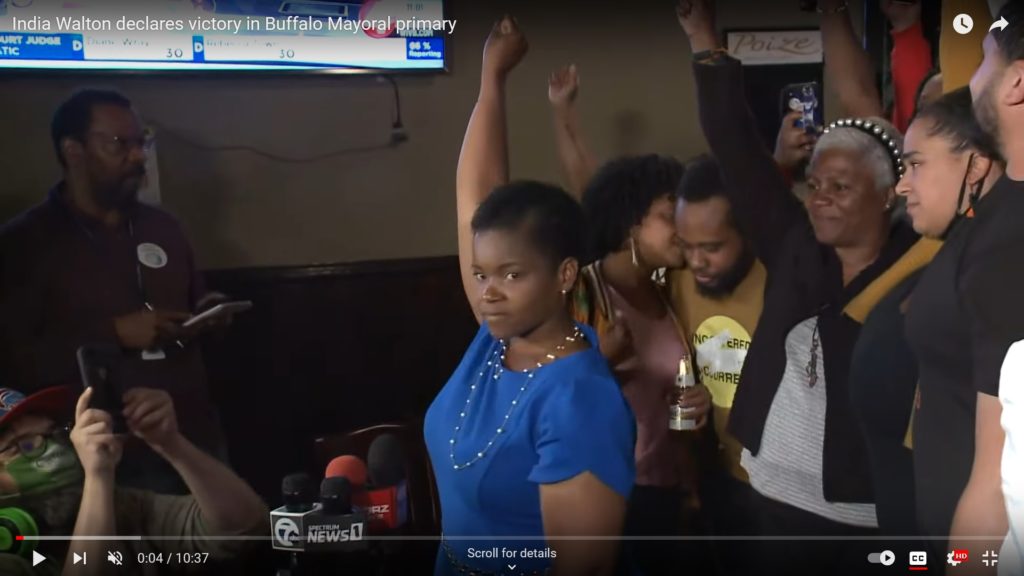AOC and India Walton
The only raw material socialist handlers would need to plant their flag convincingly on blue-collar womanhood would be a handful of respectable working-class female candidates—women with unimpeachable blue-collar resumes—for example, the woman who worked on an assembly line for years and rarely called in sick. Instead, the New York State socialists haven't, in our examples, been able to produce those women.
The conclusion I draw from the current sampling of New York socialist politicians is that their handlers have had to make do with either collegiate applicants like AOC—who need tweaking to appear working-class—or legitimately blue-collar women but who come with serious issues.
After the Laura Salamendra revelation from fellow councilor William Pealer, a question was —it was even suggested by Pealer—whether such a scene as academics feeding lines to a blue-collar front could also apply to Buffalo's India Walton. Then, of course, I'd had to wonder about Alexandria Cortez, considering rumors of her being close to an actor who auditioned for the role of a politician.
Author Peter D'Abrosca did the world a service in trying to get at the truth of Alexandria Cortez, precisely the truth behind her mystery years, the six years between her college graduation and her entry into politics. While in a book published in 2019, he couldn't fill in many of the gaps about what is known about that time of Cortez's life, his account highlighted several questions. One of those, as expressed by D'Abrosca, was:
"Why she 'had' to bartend is also a mystery. I wasn't able to get an answer about why AOC hadn't used her college degree to land a white-collar job."

Despite stonewalling from people close to Cortez, D'Abrosca revealed her image as a born-and-bred Brooklyn girl as massaged truth, as much a public relations coup as anything. Cortez left Brooklyn at the age of five and then lived a typical white suburban teen's existence; She went by the name "Sandy" in the affluent suburb of Yorktown Heights, where she excelled at science fairs. Cortez's recognized entry into politics came when her brother recommended her as a potential candidate for the PAC Brand New Congress.
If you consider D'Abrosca's implied suggestion far-fetched that Cortez may have taken work as a waitress for reasons other than to pay her bills, it certainly mattered to the Cortez team that she could claim to be a Brooklynite rather than a girl from Yorktown Heights. D'Abrosca, for instance, detailed how Cortez's residency during her years after college was likely falsified on official documents. The Cortez team left it open to the imagination that Cortez returned to Brooklyn after her graduation. D'Abrosca, however, called her residency into question:
"Despite that the fact that the Parkchester address (Bronx) is listed on her voter registration, her would-be next-door neighbor has apparently never met her. Neither has another forty-year resident of the same building who lives down the hall."
Considering the similarity that the three New York socialist women are all associated with their blue-collar employment—some hardly letting you forget it—you can reasonably wonder if Cortez became a bartender, for example, as a way to promote herself. According to D'Abrosca, at least, information seems to have been scrubbed from the internet about Cortez's life between college and the campaign other than her employment as a waitress.
Cortez is a very different case from Walton and Salamendra, however, regardless of whether Cortez is deceptive about her blue-collar status along with her residency. Salamendra and Walton are what Cortez—who is very frightened by physical confrontation —couldn't claim through fraud. Walton and Salamendra are more than run-of-the-mill blue-collar. They're street brawlers.
While India Walton campaigned to be mayor of Buffalo, regional reporters were highly interested in controversial incidents from her past, as they would be, such as why she lost jobs, made racially charged statements, or had run-ins with the law. In addition to having lost a job for allegedly threatening to break a co-worker's legs—which Walton disputes happening—she lost a second job for questionable behavior that she readily owned. In a news story about the second job, a clue may have inadvertently been given as to the tutoring Walton received.

This is how Walton lost the job: Walton asked to take time off work to look after one of her children. Then, despite the reason she'd been given time off, she flew overseas, leaving her child with her sister. The Buffalo News interviewed Walton about the incident. The reporter's concern seemed to be limited to Walton's ethics in the workplace. What is relevant about the incident as it applies here is the nature of the trip overseas.
This is what Walton had to say to The Buffalo News about the incident that cost her a job:
"So, I called my sister, and I asked her to look after my child while I went to Barcelona for three days for a professional development opportunity. Kind of a once-in-a-lifetime thing, right? Young girl who grew up on the East Side, and I get a chance to attend an international conference about how to make the place I live better and learn from some of the best in the field. I kind of didn't want to pass it up," she said.
I think it's highly likely the Barcelona conference Walton referred to was The Fearless Cities Summit. Walton was, in fact, a speaker the following year, in 2018, at a Fearless Cities event.
Due to the Fearless Cities' inaugural event taking place in 2017, the year Walton flew to Barcelona, the summit received a special mention in a book that is an introduction to municipalism. Municipalism is, essentially, a tactic of accumulating progressive power at the local level. The book, available on the Fearless Cities website, includes this passage:
"In June 2017, we all came together for the first time for the first municipalist summit, 'Fearless Cities,' in Barcelona. That event, which gathered over 700 participants, from every continent, was a turning point. It was living proof that we are not alone; that each individual municipalist initiative forms part of an emerging global movement that transcends local and national borders."
Whatever the specifics of Walton's Barcelona trip—who paid for it and how the invitation came—her involvement with the Fearless Cities organization looks to have had a noticeable effect. While Walton commonly refers to herself as a democratic socialist, she has, such as when she addressed the University of Buffalo's School of Architecture and Planning, described herself as a municipalist. In that instance, more specifically, she said she was "a huge municipalist."
Conclusion
The initial impression you get from articles about female socialists in New York State is that the socialists have found fertile ground among working-class women. As you scratch the surface, however, there are academics and more academics.
Buffalo's India Walton griped in various interviews about her challenger Byron Brown's major contributors, primarily developers and other business people. But in a Buffalo News column where Brown's top ten contributors were listed, Walton's were also. Her top three were retired professors from the University of Buffalo.
Why any of the women profiled would work as hard as they have to obscure the mechanics of their operations may be up for debate. Regardless, we're meant to see the projection of working-class women.
I'll close by referencing something I stumbled onto while writing this article. It was an article in a college newspaper that announced the likely primary win of a socialist in the college town of Ithaca, New York, a city near Geneva. A statement made by socialist candidate Tiffany Kumar is loaded with meaning:
"I'm not a person that the systems that uphold this country intended to have power, to be in an elected office. My mom is an immigrant, working class. My family came from a really difficult background," Kumar said. "I'm a first gen. [college] student. I was a transfer. I'm Asian American. Queer. Socialist."
There is Kumar's tenuous connection to the working class—not that she lives by blue-collar employment, but that her mother did—then there is also Kumar's veiled racism or sexism: "I'm not a person that the systems that uphold this country intended to have power." Who would be, then?
Another relevant detail comes in a statement made by Kumar's rival—a democrat— incumbent alderperson Patrick Mehler, who happens to be white. Another line from the article:
"Mehler expressed frustration with some of the malicious tactics that his opponent used and believes that Kumar won't be able to keep the lofty promises she's made to her voters."
I attempted to contact Mehler to ask what he meant by "malicious tactics," but he didn't respond to inquiries.
Red flags appear even in an article about a race for an entry-level political position. The story suggests that someone has employed a take-no-prisoners approach to campaigning.
There is a preferred battle plan among socialists, and despite how working-class women are name-checked by them, the inclusion of typical working-class women seems to be an optional feature.



